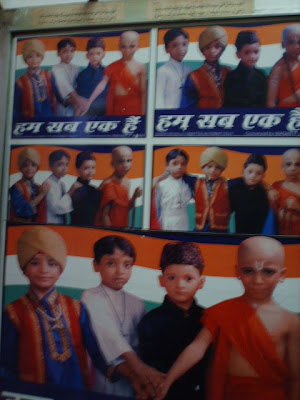By Abdul Hameed, TwoCircles.net,
Mumbai: Asia’s largest slum Dharavi on Tuesday was mourning for Waqar Peyare Khan, a man always ready to help others. In the lanes of the slum, witness to his activities for communal harmony, people raised his coffin, brought from Goa, with ten ft bamboo framework attached to it and exchanging their shoulders they took the coffin to nearby Tarwadi Qabrastan. Waqar Peyare Khan has left behind an orphaned Dharavi, said someone among the mourners.
Waqar Khan who settled in Dharavi from his native village Anwla in Bareli district of Uttar Pradesh in late seventies as a banana vendor soon became a shirt exporter with his own shop in a narrow street at 90 ft Road Dharavi.
‘Having completed the 7th standard from Chacha Nehru School in Anwla Waqar Khan left for Mumbai in 1979. First he peddled bananas in the streets, then he sold shirts made of recycled cloth. When he had saved enough money, he bought a sewing machine and eventually began manufacturing new shirts. With more savings, he was able to open the Readymade Shirts shop. Now, we have our trade in Maharashtra, Goa and Karnataka,’ said his brother Nigar Khan.
The curiously named Khan’s shop ‘Campus Shirts’ has been a centre for campaign to foster peaceful relations between the Hindus and Muslims. Whenever there was a disagreement among the neighbors Waqar Khan was the person to get it settled either by him or by intervention of police officers. The exemplary yeoman service towards communal harmony won him the ‘Gandhi Peace Award’ in March 2008.
Nearly half of the gate of Khan’s shop and a part of the wall is devoted to ‘Ham Sab Ek Hain’ (We all are one.) image. Some frames tacked with the wall are live witness that the union agriculture minister Sharad Pawar and then Maharashtra minister for home R R Patil handed over the award to Khan.

Poster at the gate
Made by Khan the poster ‘Ham Sab Ek Hain’ (We all are one.) depicts four children against the backdrop of tricolor Indian Flag – each one dressed as a member of different religion: a Hindu with a U-shaped tilaka on his forehead, a Muslim wearing a dark brown traditional skullcap, a Sikh putting on a beige turban and a Christian with a silver cross dangling around his neck. Below it is the caption which reads ‘Fight Against Terrorism. We all are one.’
Amrul Islam Khan, one of his close relatives, told, ‘In 1992-93 Mumbai communal riots Khan was deeply hurt to see the neighbours turning enemy to each other. He asked both the communities to be united and despite being a Muslim he went to the Hindu dominated areas to rescue the injured ones and bury the dead bodies left without any heir. He believed in communal harmony and unity.’
The poster, symbolic to the ‘Hindu Muslim Sikh Isai, Aapas Mein Hain Bhai Bhai’ (Hindus, Muslims, Sikhs and Christians are brothers to each other), is such an effort by him to unite Indians. The greatest achievement of Khan in his life, the poster found its due and became ubiquitous when law enforcement officials posted it at police stations and traffic stops across Mumbai.
For him it was pleasing to see people holding the image during the post-26/11 historical citizen rally organized at The Gateway of India in protest to the politicians.
In order to work more efficiently in the field of communal harmony Khan joined Dharavi Mohalla Committee, one of several such committees established throughout the city by Mumbai Police after the 1992-93 riots in an effort to bring together Muslim and Hindu community leaders.
A one-minute video ‘Ham Sab Ek Hain: Ekta Sandesh’ (We all are one; the message of unity) which features a Muslim child helping a Hindu by donating him blood, a Hindu a Muslim and so on, during the devastating earthquake that struck Gujarat in 2001, was aired on public broadcaster Doordarshan.
Muhammad Aslam, a neighbor said, ‘Waqar Khan was broad minded, well wisher for all and a practicing Muslim too.’
A film named Naata has been made on Waqar Khan and his close friend Bhau Korde. Produced by Centre for Media and Cultural Studies and Tata Institute of Social Sciences Mumbai, Naata has Anjali Monteiro and K. P. Jayasankar as its script writer, editor and director and it explores their work regarding conflict resolution and for neighborhood peace.
Shaikh Azad Husain, one of his close friends narrated, ‘Waqar Khan with the co-operation of Bhau Korde and others would manage free medical camps, host Iftar parties in the month of Ramazan and hold programs on the day of Holi (a religious Hindu festival).’
These exemplary contributions of Waqar Khan made him beloved to all irrespective of caste or creed. When he died of heart attack at 9:30 pm on Monday in one of Goa hospitals not only his widow, three daughters and two sons but also the whole Dharavi felt it has lost a valuable asset. Thousands of people including senior police officers and political leaders attended his funeral.
